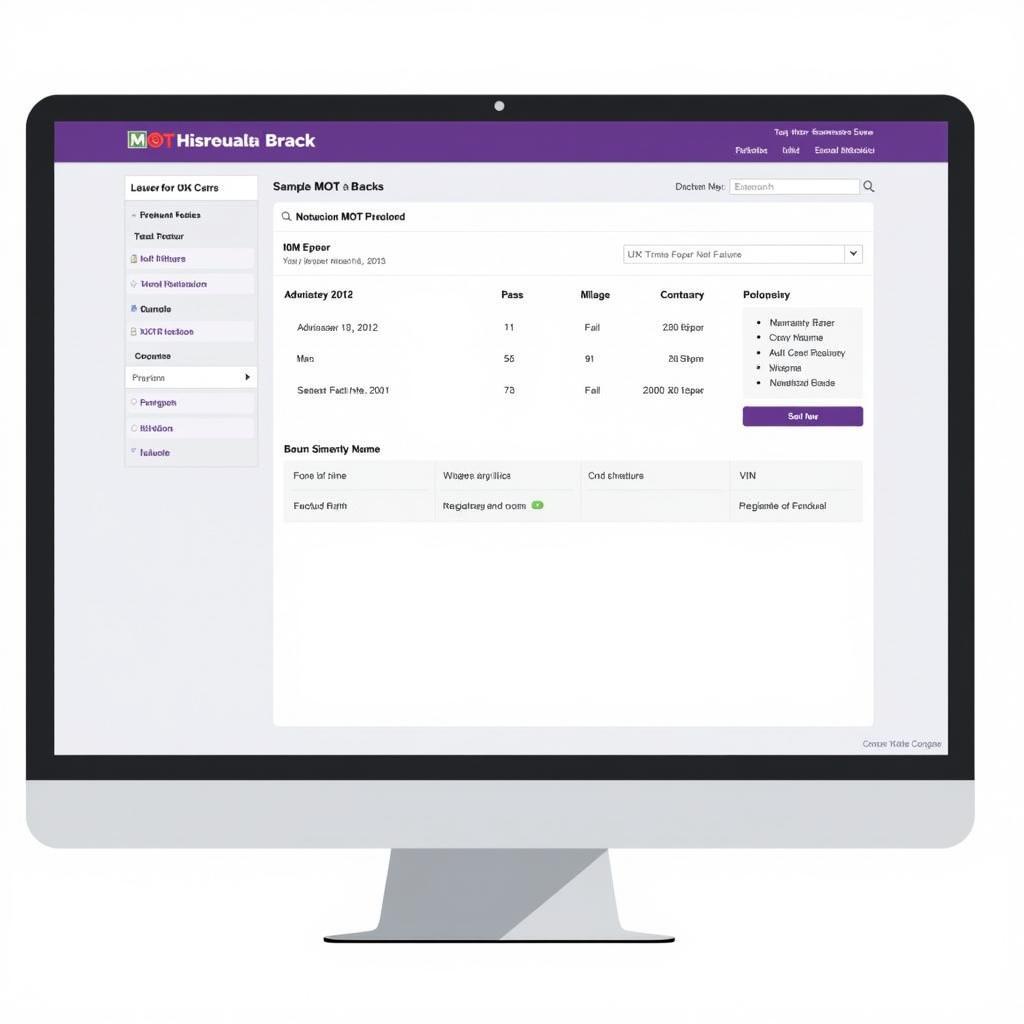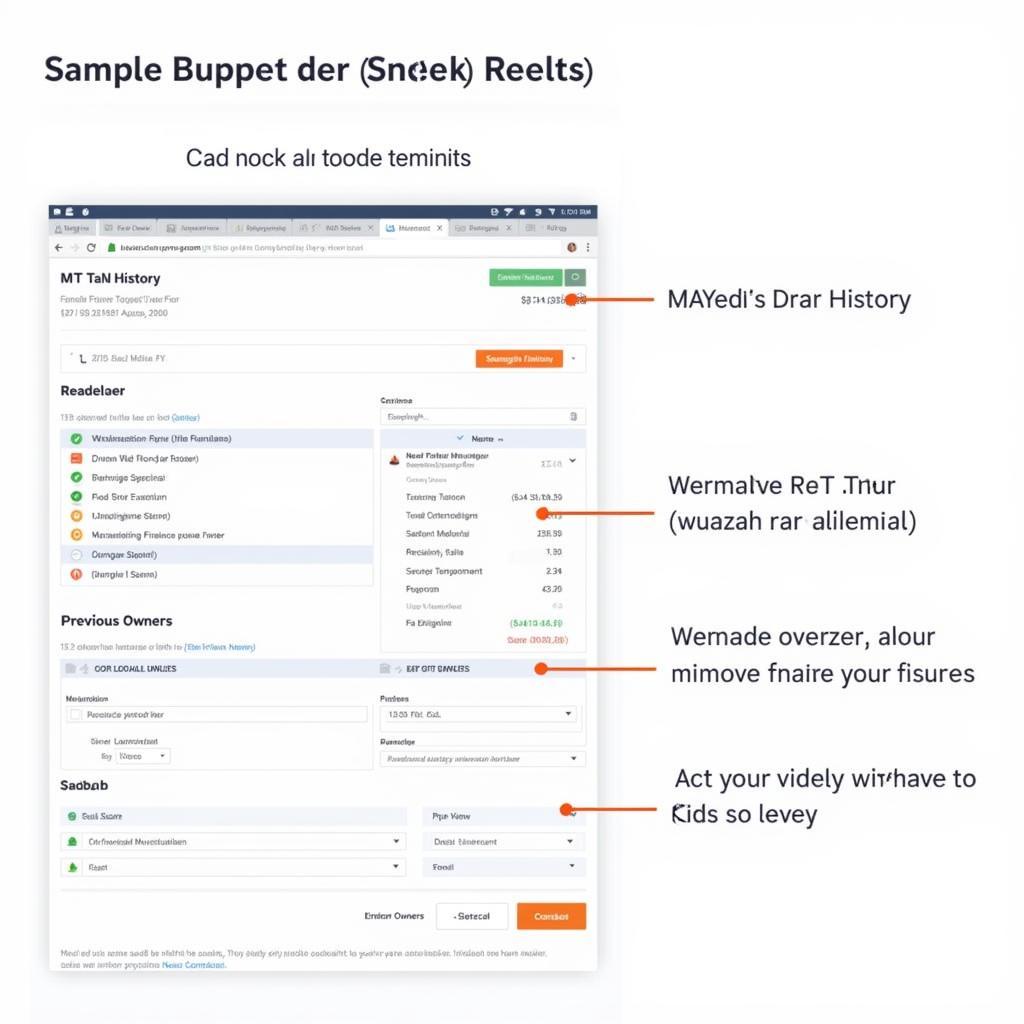Checking car details in the UK is crucial before buying a used vehicle. It helps you avoid potential problems like outstanding finance, hidden damage history, or even stolen vehicles. This guide will equip you with the knowledge and tools necessary to perform a comprehensive car history check and make informed decisions.
Why is Checking Car Details Important?
A thorough car detail check can reveal a wealth of information, protecting you from costly mistakes and legal complications. It helps you assess the true value of the car, negotiate a fair price, and avoid inheriting someone else’s problems. Imagine purchasing a seemingly perfect car, only to discover later that it has outstanding finance, meaning you could lose both the car and your money. This is where checking car details becomes vital. Similar to how much does it cost to have car detailed, understanding the history of a vehicle can save you money in the long run.
Essential Information to Look For
When checking car details, focus on key areas like the vehicle’s MOT history, mileage verification, outstanding finance, and previous owners. These details provide valuable insights into the car’s condition and history.
Vehicle Identification Number (VIN)
The VIN is a unique 17-character code that acts as the car’s fingerprint. It provides access to crucial information about the car’s specifications, manufacturing history, and recall records.
MOT History Check
The MOT history check allows you to view the car’s past MOT test results, advisories, and failures. This reveals potential recurring mechanical issues and helps you gauge the car’s maintenance history. Is the MOT due soon? Have there been consistent failures related to a specific component? This information empowers you to make informed decisions.
 Car MOT History Check UK: Example of an online MOT history report
Car MOT History Check UK: Example of an online MOT history report
Mileage Verification
Discrepancies in mileage can indicate potential clocking, a fraudulent practice where the mileage is rolled back to make the car appear less used. Verifying the mileage against historical records is crucial to avoid overpaying for a car with manipulated mileage.
Outstanding Finance Check
Before purchasing a used car, ensure that there’s no outstanding finance attached to it. If you buy a car with outstanding finance, you could become liable for the remaining debt and even lose the car. Performing an HPI check will reveal any outstanding finance, ensuring a smooth transaction.
Previous Owners Check
Knowing the number of previous owners can offer insights into the car’s overall condition and maintenance. While a higher number of owners isn’t necessarily a red flag, it can be a factor to consider when assessing the car’s history.
 Car Data Check Online Resources: Various websites and platforms for checking vehicle history
Car Data Check Online Resources: Various websites and platforms for checking vehicle history
Where to Check Car Details in the UK
Several reputable platforms provide comprehensive car history checks. The UK government’s Driver and Vehicle Licensing Agency (DVLA) offers basic information, while private companies like HPI Check and Experian provide more detailed reports, including outstanding finance and stolen vehicle checks. Choosing a reliable source is crucial for accurate and up-to-date information. You might find our guide on how much do you tip for getting your car detailed interesting as well, especially if you’re considering a detailed car after purchasing.
Understanding Data Protection Regulations
When checking car details, be mindful of data protection regulations. Ensure you have legitimate reasons for accessing the information and use it responsibly.
How Do I Interpret the Results of a Car Details Check?
Interpreting the results of a car details check requires careful analysis. Look for any inconsistencies in the reported information, such as significant mileage discrepancies or gaps in the MOT history. Consult with a qualified mechanic if you have any doubts or concerns about the car’s condition. Just like understanding what means a complete detail car, knowing how to interpret a car details check is essential for informed decision-making.
 Interpreting a Car History Report UK: Key elements to analyze in a vehicle history report
Interpreting a Car History Report UK: Key elements to analyze in a vehicle history report
Conclusion
Checking car details in the UK is an indispensable step in the used car buying process. By following this guide and utilising the resources available, you can make informed decisions, protect yourself from potential risks, and drive away with confidence. Knowing how to check car details empowers you to negotiate a fair price and ensures you’re not inheriting hidden problems. For those interested in learning more about car detailing itself, check out our guide on how to learn how to detail cars. Or if you’re wondering how do i get details on my car, we have a guide for that too.
FAQ
-
What is a VIN?
A VIN, or Vehicle Identification Number, is a unique 17-character code that identifies a specific vehicle. -
Where can I find the VIN?
The VIN can typically be found on the vehicle’s dashboard, driver’s side doorjamb, or vehicle registration documents. -
What does an MOT history check show?
An MOT history check shows the car’s past MOT test results, including dates, mileage, pass/fail status, and any advisories or failures. -
Why is mileage verification important?
Mileage verification helps ensure the odometer reading is accurate and hasn’t been tampered with. -
How can I check for outstanding finance on a car?
You can check for outstanding finance by performing an HPI check or using similar services that provide vehicle history reports. -
What should I do if I find discrepancies in the car’s history?
Consult with a qualified mechanic and consider walking away from the purchase if you have concerns about the car’s history. -
How often should I check a car’s details? Ideally, before any used car purchase.
Need help? Contact us via WhatsApp: +1(641)206-8880 or Email: [email protected]. Our customer support team is available 24/7.

Leave a Reply